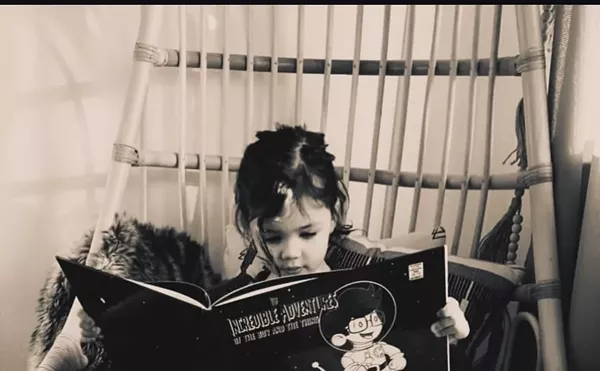For whatever reason, Oleanna is gracing the boards yet again at a local theater (there have been at least three other productions in the past two years), this time mounted by the Director's Theatre at the new Guild at the Dairy, a performing- and visual-arts space in Boulder that's home to several community theaters.
The by-now-familiar play revolves around issues of sexual harassment, political correctness and higher education. John is slapped with a lawsuit and, later, criminal charges by Carol for his inappropriate behavior. Were his actions criminal? It all depends, Mamet implies, on your point of view. By the time it's over, we're not sure whose side we agree with, which is precisely the point of the play.
Under the direction of Charlie Mitchell, the story of Carol (Cary Seston), a college student who is failing her course, and John (Timothy Reed), her teacher, is brought to life for 100 angst-filled minutes. And even though both actors are appealing enough in their portrayals, there is not much sense of a play here, as several moments occur that stretch the limits of credulity.
Mamet often writes his dialogue in fragments, punctuated by dashes and ellipses that are intended to signal moments when characters interrupt each other (or their own inner monologues) mid-thought. Meant to imitate the language of everyday life, the playwright's dialogue often rings false when actors attempt to bend its patterns to their own sensibilities.
Unfortunately, Reed and Seston suit the action to themselves, and Mitchell has apparently abided, rather than corrected, their predilections. As a result, their student-teacher relationship is rarely believable. For example, unbridled shrieking by Seston is simply an actress's self-indulgence--no teacher would permit her behavior in his office without making some effort (at least a gesture, which Reed is somehow unable to manage) to quiet her. Nor is Reed's physical attack on Seston at the end of the play at all credible. When the moment arrives, he prances across the stage and flails at her as though she were a swarm of bees, not the malicious woman who has torpedoed his life.
Like any good play, Mamet's script survives any treatment given to it. But why saturate the local theater scene with it? Part of the responsibility for that lies with the playwright, who could restrict the rights to his work if he wanted to. However, Mamet and the theaters that have produced his plays might have their reasons for flooding the market with Oleanna--namely, to get as much mileage out of it as they can while it's still a hot commodity. As a glance at the 1997-1998 schedules for more than 260 theaters nationwide indicates, the play's topicality may have finally waned: Oleanna isn't scheduled to play in any of them.
--Lillie
Oleanna, through November 22 at the Guild at the Dairy, 2590 Walnut Street, Boulder, 499-5552.












